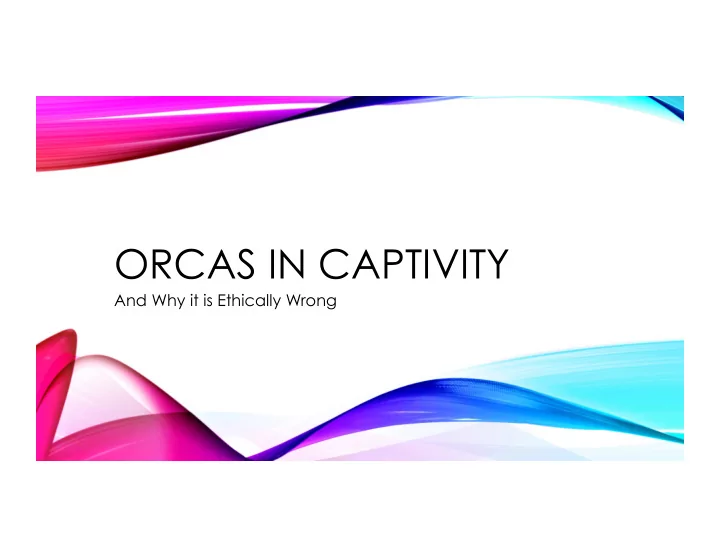

ORCAS IN CAPTIVITY And Why it is Ethically Wrong
Theory: Preference Utilitarianism Orcas in captivity can’t live a natural life • Often live alone, and are separated from family groups (can’t learn from others or exhibit social behaviors). • When they are not alone, they can’t swim away to avoid conflict. • Can’t swim as they would in the wild; pools can’t be built big enough to accommodate their needs Orcas’ preference to live a natural social life in a natural environment is not satisfied.
Some don’t get the chance to live at all • Orcas are very hard to successfully breed in captivity. • The mortality rate is about 50% for captive-born calves. • The inbreeding of captive Orcas causes health problems. • When the young do survive, they are separated from their mother far too early. Orcas’ preference to breed and rear their young naturally is not satisfied.
What do humans get out of it? Spectators/Visitors: • Roughly 25 minutes of entertainment Owners/ Employees • Money Human preference: money and entertainment
Orcas have a strong preference to live a natural life . They desire to have the ability to choose who to mate with to avoid inbreeding. The young desire to live along side their mother which may not happen in captivity, if they survive at all. The orca’s preferences outweigh the preference humans have for some entertainment or an increase in profits.
Argument: Environmental Ethics (Ecocentrism) An Ecocentrist might say that the money the facility contributes to the conservation of marine mammal species is worth a few individuals suffering. This is wrong because: • Only individuals have inherent value. • Of all the donations SeaWorld makes, only 14% goes to the conservation of wild sea mammals. This is only 0.88% of the money spent on all of their projects. Their number one priority is profit They are focused on fulfilling their own preferences.
An Ecocentrist might also say that captive breeding helps introduce new orcas into the wild which would help strengthen the species. This is wrong because: • Captive-bred orcas can’t be released into the wild because they never had the chance to learn the behaviors they would need to survive. • The individual would likely die if released into the wild.
An Ecocentrist might say that it is ethically justified to keep orcas in captivity because they act as an animal advocate which would aid conservation efforts for the species as a whole in the wild. This is wrong because: • Again, the species as a whole doesn’t have inherent value. • It’s not like a zoo exhibit. In these shows the people aren’t learning about orcas. They’re just there to see the animals do tricks. • The visitors aren’t even seeing them preform natural behaviors. • These shows teach children that animals are meant for our use as entertainment.
Conclusion Keeping orcas is captivity is not ethically justified because the orca’s desire to live a natural life is more important than the humans preference to be entertained or increase their profits . The ethicality of keeping an animal in captivity differs species to species because their preferences differ. So each species should be considered separately.
Recommend
More recommend